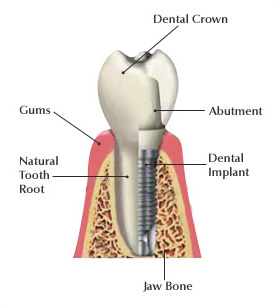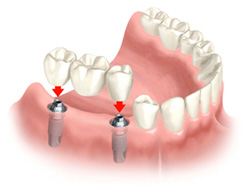Dental Implants in NYC
Central Park Dentistry specializes in dental implants for patients in NYC. Quite a few people are familiar with the concept of dental implants and may even know one or two people who may have them. This page will provide you with more information about dental implants, the benefits and what they are used for.
What Are Dental Implants?
 For years man has struggled with the problems associated with tooth loss, while dreaming of being able to replace missing teeth with something better than dentures. Dental implants are often the answer.
For years man has struggled with the problems associated with tooth loss, while dreaming of being able to replace missing teeth with something better than dentures. Dental implants are often the answer.
The easiest way to think of a dental implant is as an artificial tooth root, and a standard implant consists of three parts. The first part is a titanium post that is inserted into the jawbone during a small surgical procedure. Titanium is used because this material is extremely inert and shouldn’t cause any reactions. The second part is called an abutment and is attached to the titanium post. The abutment sticks up just above the gum line, almost like a tiny stubby tooth. It is used to support the replacement tooth, which forms the third part of the implant.
Dental implants provide a permanent and better alternative to dentures, crowns, and bridges. They consist of three different parts:
- The Implant: This is a screw that directly connects to your jaw and acts as a root for your replacement tooth. In some situations, bone may need to be grafted before the implant can be installed.
- An Abutment: Part of the implant that secures the prosthetic tooth.
- Crown: This is the actual prosthetic tooth. It is made of porcelain, zirconium, or another dental material and is prefabricated in a dental lab so that it fits perfectly with your natural teeth.
What Are Dental Implants Used For?
Dental implants are extremely versatile and can be used in the following ways:
- To replace a single tooth, with a crown as the final part of the implant.
- To support dental bridges, replacing multiple teeth or even complete arches.
- People with full dentures can use implants to secure them firmly in position, and it only takes a few implants to support a complete denture.
What Are the Benefits of Having a Dental Implant?
Dental implants are often considered to be the gold standard for replacing teeth. The reason for this is the way they replicate natural tooth roots. Your teeth roots transmit forces created during biting and chewing into the surrounding bone. This tells the body to continue renewing old bone cells so the bone stays strong and healthy. Dental implants provide a similar level of stimulation, helping to prevent bone loss. Implants keep the remaining natural teeth in the correct positions, and don’t require natural teeth to be adapted in any way. In comparison, bridges often require healthy teeth to be cut down and crowned, while dentures can rub on the gums, increasing the rate of bone loss.
What Is the Procedure for Having a Dental Implant?
 You will need to visit a dental implant dentist in NYC to find out if you are suitable for treatment. Planning is vital for implant success, and your dentist will need to carry out a number of diagnostic tests including x-rays and quite possibly a CT scan. These help show the quantity and quality of bone in your jaw, as well as the locations of various important structures such as nerves, blood vessels and sinus cavities. Your implant dentist uses this data to plan the implant placement. This is a skilled process, as it’s essential to avoid important structures while still ensuring the final result will look natural and is completely functional.
You will need to visit a dental implant dentist in NYC to find out if you are suitable for treatment. Planning is vital for implant success, and your dentist will need to carry out a number of diagnostic tests including x-rays and quite possibly a CT scan. These help show the quantity and quality of bone in your jaw, as well as the locations of various important structures such as nerves, blood vessels and sinus cavities. Your implant dentist uses this data to plan the implant placement. This is a skilled process, as it’s essential to avoid important structures while still ensuring the final result will look natural and is completely functional.
Who Can Have Dental Implants?
Implants are suitable for just about anyone in reasonable health and who doesn’t have any conditions affecting their immune system that could affect healing. If you smoke you will need to quit before surgery. This treatment is perfectly suitable for older people as age shouldn’t be a problem. Contact our office for more information about dental implants in NYC or to schedule your no-obligation consultation.
